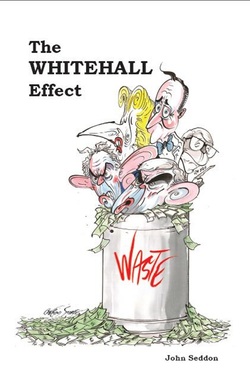The Whitehall Effect ~ John Seddon - Online Notes
|
Links below take you to the chapter notes:
Introduction 1. Prelude Part 1: The industrialisation of public services 2: Call centres 3. Back Offices 4. Shared Services 5. Outsourcing 6. Information Technology Part 2: Delivering services that work Introduction 7. A better philosophy 8. Effective change starts with ‘study’ 9. Better thinking, better design 10. ‘Locality’ working 11. IT as pull, not push Part 3: Things that make your head hurt 12. Targets and standards make performance worse 13. Inspection can’t improve performance 14. Regulation is a disease 15. It’s the system, not the people 16. Incentives always get you less Part 4: ideology, fashions and fads 17. Choice 18. Personal Budgets 19. Commissioning 20. Managing demand 21. Nudge 22. Procurement 23. Risk management 24. Lean 25. IT: features over benefits Part 5 Change must start in Whitehall 26. Beware economists bearing plausible ideas 27. Whitehall is incapable of doing evidence 28. Getting a focus on purpose |
26. Beware economists bearing plausible ideas
1] See Local Government Chronicle 5 November 2008, ‘Explained: Keynesian Economics’. Byline: James Illman: “Keynes advocated active state intervention in the marketplace as the best means of stimulating economic growth and promoting stability. Taxation, interest rates and public projects are all central levers of control.” 2] Neoliberalism: “An approach to economics and social studies in which control of economic factors is shifted from the public sector to the private sector. Drawing upon principles of neoclassical economics, neoliberalism suggests that governments reduce deficit spending, limit subsidies, reform tax law to broaden the tax base, remove fixed exchange rates, open up markets to trade by limiting protectionism, privatize state-run businesses, allow private property and back deregulation.” View 3] John Maynard Keynes, 1991, The General Theory of Employment, Interest and Money, Macmillan, pp.383-384. First published in 1936. 4] Paul Ormerod, 1994, The Death of Economics, Faber and Faber, pp.ix-x. 5] Steve Keen, 2001, Debunking Economics: the Naked Emperor of the Social Sciences, Zed, p.4. 6] Ha-Joon Chang, 2010, 23 Things They Don’t Tell You About Capitalism, Penguin, pp.62-63. 7] John Maynard Keynes, op. cit., pp.383-384. 8] BBC News website, 1 October 2012, ‘Mervyn King’s economic inspirations’. View “[King] credits Hayek with having given economists a valuable warning against hubris. We can't predict the future, [King] says. And we probably can’t prevent more crises from happening.” 9] Financial Times, 30 May 2014, ‘An astonishing record – of complete failure’. Byline: Tim Harford. View 10] See John Kay, 4 October 2011, ‘The Map is Not the Territory: An Essay on the State of Economics’. View 11] Steve Keen, op. cit., p.4. 12] John Kay, op. cit. 13] Friedrich Hayek, 11 December 1974, ‘Lecture to the memory of Alfred Nobel: The Pretence of Knowledge’. View 14] Robert Heilbroner, 1953, The Worldly Philosophers, Simon and Schuster. 15] Joan Robinson, 1978, Contributions to Modern Economics, Academic Press, p.75. 16] Julian Le Grand, 2007, The Other Invisible Hand: Delivering Public Services through Choice and Competition, Princeton University Press. 17] The Observer, 11 May 2014, ‘After the crash, we need a revolution in the way we teach economics’. Byline: Ha-Joon Chang and Jonathan Aldred. View 18] Thomas Carlyle, the 19th century Scottish essayist and historian described the emerging discipline of economics as the “dismal science”. The term was inspired by T. R. Malthus’s gloomy predictions that population would always grow faster than food, dooming mankind to starvation, unending poverty and hardship. 19] Philip Mirowski, 2013, Never let a serious crisis go to waste: How Neoliberalism survived the financial meltdown, Verso, p.24. 20] Op. cit. pp.17-22. 21] German economist Johann F. von Pfeiffer, 1777, as quoted in Erik S. Reinert, 1999, ‘The role of the state in economic growth’, Journal of Economic Studies Vol. 26 No 4/5, p.315. |

